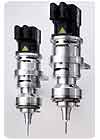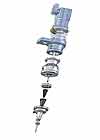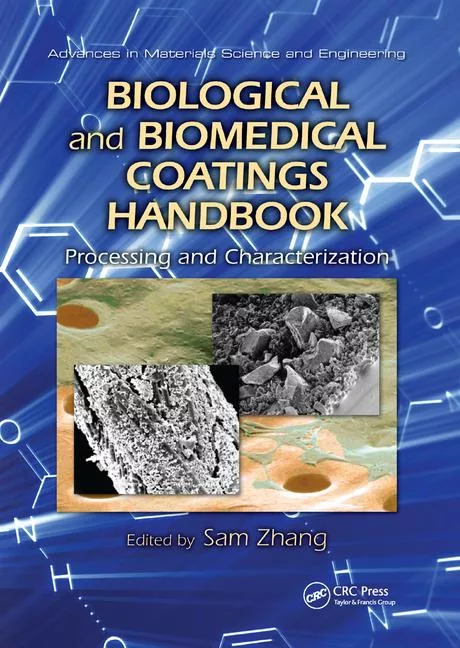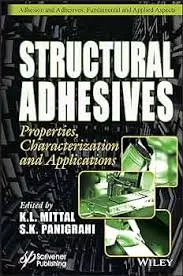The Two-Component Revolution
New technology reduces maintenance downtime.

A new two-component mixing head features a patented, servo-driven ceramic valve system. The RAMPF MS-C dynamic mixing system simplifies two-component meter, mix and dispensing operations by reducing downtime for cleaning and maintenance. This is accomplished by a ceramic valve disk system with no dynamic seals. Maintenance time is reduced because the ceramic valves do not require the frequent cleaning and rebuilding of needle valves. The ceramic valve and mixing sections are separate, allowing the mixing chamber and mixer to drop down with a quick coupler for a rapid change. Recirculation of the components through the mix head keeps the materials consistent from shot to shot. Temperature-control systems are available that stabilize the materials regardless of ambient conditions.
The process begins with gear pumps precisely metering the resin and catalyst entering the mixing head, ensuring that the correct mix ratio is held. The MS-C servo motor rotates the valve disks to the proper position, aligning the valve openings. The servo also turns the mixer up to 6,000 rpm to energize and thoroughly blend the materials. The shutoff valve is opened and the shot is made. The MS-C is capable of dispensing 2 g/sec. and up to 120 g/sec., and mixes two to three components at viscosities of 50-200,000 cps. A rinsing system of either solvent or high-pressure water automatically flushes the mixing chamber.
 The mixing system is more
robust with less dynamic seals wear items and required spare parts. Older,
complex mix-head designs require a preventative maintenance schedule that keeps
systems running if adhered to. However, if maintenance is neglected, problems
result. This new design is significant because problems with resin dispensing
systems usually aren’t noticed until hundreds of bad parts are produced.
The mixing system is more
robust with less dynamic seals wear items and required spare parts. Older,
complex mix-head designs require a preventative maintenance schedule that keeps
systems running if adhered to. However, if maintenance is neglected, problems
result. This new design is significant because problems with resin dispensing
systems usually aren’t noticed until hundreds of bad parts are produced.
Two-component reactive materials, such as polyurethane, silicone or epoxy, consist of a resin and a catalyst. The materials must be metered to the proper mix ratio, mixed and dispensed. Some materials, such as polyurethane and silicone foams, require dynamic mixing - blending the two components using a high-speed mixer. As the materials are continually metered and mixed, the system must be capable of maintaining an accurate mix ratio while dispensing multiple shots.
 The RAMPF MS-C dynamic mixing
head solves many problems associated with processing reactive resins.
The RAMPF MS-C dynamic mixing
head solves many problems associated with processing reactive resins.
 The MS-C system replaces the
needle valves used in a conventional dynamic mix head with the internal ceramic
valve system, thereby reducing maintenance headaches for users. Older mix heads
require one valve for the resin, another valve for the catalyst and valves for
air and cleaning solvents. These valves must be cleaned and maintained in order
to operate properly. Should a valve become restricted, the mixing ratios can
become flawed. Preventative maintenance on the valves consists of frequent
cleaning of the valve tip, as well as valve rebuilding, since dynamic seals are
wear items. When this maintenance is neglected, the mix ratio can change and
result in scrap parts. Older mix-head designs may be extraordinarily complex.
Some dynamic, two-component mix heads may have as many as 360 parts and one
material valve that consists of 100 parts by itself. These older designs are
difficult to maintain and service. Material valves with this degree of
complexity may have to be returned to the factory for rebuilding, requiring backup
inventory of all valves.
The MS-C system replaces the
needle valves used in a conventional dynamic mix head with the internal ceramic
valve system, thereby reducing maintenance headaches for users. Older mix heads
require one valve for the resin, another valve for the catalyst and valves for
air and cleaning solvents. These valves must be cleaned and maintained in order
to operate properly. Should a valve become restricted, the mixing ratios can
become flawed. Preventative maintenance on the valves consists of frequent
cleaning of the valve tip, as well as valve rebuilding, since dynamic seals are
wear items. When this maintenance is neglected, the mix ratio can change and
result in scrap parts. Older mix-head designs may be extraordinarily complex.
Some dynamic, two-component mix heads may have as many as 360 parts and one
material valve that consists of 100 parts by itself. These older designs are
difficult to maintain and service. Material valves with this degree of
complexity may have to be returned to the factory for rebuilding, requiring backup
inventory of all valves.
The new RAMPF MS-C combines simple design with high-tech ceramic materials to reduce downtime and keep production up and running.
For more information, contact RAMPF Group Inc., 50714 Century Court, Wixom, MI 48393; phone (248) 295-0223; fax (248) 295-0224; e-mail info@rampf-group.com; or visit www.rampf-group.com.

The MS-C at work.
A new two-component mixing head features a patented, servo-driven ceramic valve system. The RAMPF MS-C dynamic mixing system simplifies two-component meter, mix and dispensing operations by reducing downtime for cleaning and maintenance. This is accomplished by a ceramic valve disk system with no dynamic seals. Maintenance time is reduced because the ceramic valves do not require the frequent cleaning and rebuilding of needle valves. The ceramic valve and mixing sections are separate, allowing the mixing chamber and mixer to drop down with a quick coupler for a rapid change. Recirculation of the components through the mix head keeps the materials consistent from shot to shot. Temperature-control systems are available that stabilize the materials regardless of ambient conditions.
The process begins with gear pumps precisely metering the resin and catalyst entering the mixing head, ensuring that the correct mix ratio is held. The MS-C servo motor rotates the valve disks to the proper position, aligning the valve openings. The servo also turns the mixer up to 6,000 rpm to energize and thoroughly blend the materials. The shutoff valve is opened and the shot is made. The MS-C is capable of dispensing 2 g/sec. and up to 120 g/sec., and mixes two to three components at viscosities of 50-200,000 cps. A rinsing system of either solvent or high-pressure water automatically flushes the mixing chamber.

The
RAMPF MS-C mixing head is available in two different sizes for output rates
between 2 g/s and 120 g/s.
Two-component reactive materials, such as polyurethane, silicone or epoxy, consist of a resin and a catalyst. The materials must be metered to the proper mix ratio, mixed and dispensed. Some materials, such as polyurethane and silicone foams, require dynamic mixing - blending the two components using a high-speed mixer. As the materials are continually metered and mixed, the system must be capable of maintaining an accurate mix ratio while dispensing multiple shots.

The
servo-driven ceramic valve system combines precision, reliability and durability.
- Its internal ceramic valve system does not require frequent inspection, maintenance or cleaning.
- High output rates to 120 grams per second are possible, as well as precise dispensing down to 2 g/sec.
- Accurate mix ratios are consistently held.
- Precise nucleation levels are monitored by a RAMPF nucleation controller.

The new RAMPF MS-C combines simple design with high-tech ceramic materials to reduce downtime and keep production up and running.
For more information, contact RAMPF Group Inc., 50714 Century Court, Wixom, MI 48393; phone (248) 295-0223; fax (248) 295-0224; e-mail info@rampf-group.com; or visit www.rampf-group.com.
Links
Looking for a reprint of this article?
From high-res PDFs to custom plaques, order your copy today!






